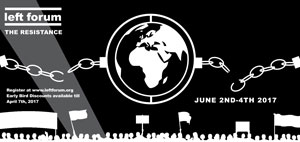Each spring Left Forum convenes the largest gathering in North America of the US and international Left. It provides a context for the critical conversations that are essential for a stronger Left and a more just society.
Thousands of conference participants come together to discuss pressing local, national and global issues; to better understand commonalities and differences, and alternatives to current predicaments; or to share ideas to help build social movements to transform the world.
This year’s Left Forum conference theme is: The Resistance. ‘The Resistance’ undoubtedly conveys something that is simultaneously broad, multi-layered, historically rich, and consistently relevant (now more than ever).
The Forum will again take place at the conference center at John Jay College, New York.
Website: www.leftforum.org
transform! europe will be present in three panels:
Transatlantic Dialogue: The Left and the ‘Struggle of Giants’
Sunday, 4 June, Session 5
10:00 am – 11:50 am, Room 1.107
The election of Donald Trump who made no attempt in hiding his narcissism, racism and contempt for women but has turned these into trademarks, raises important questions for the Left, both in the US and in Europe. To which extent is this bizarre character residing in the White House more than a ‘normal pathology’ but rather the symptom of a ‘a pathological normalcy’ as Dutch political scientist Cas Mudde portrays right populism. If so, Donald Trump would not only resemble his European counterparts Strache, Hofer, Orbán, Le Pen, and Wilders, his presidency would epitomize a trend in contemporary capitalism, perhaps even introduce a new type of capitalist governance.
On the other hand, most recent electoral results in Western Europe (Austria, Netherlands and France) suggest that the established forces of neo-liberalism do not surrender easily to their right wing adversaries. By reshuffling the party systems and employing a populist political style themselves they seem to manage to withstand their onslaught.
So the question is, can the Left remain indifferent in this ‘fights between the giants’. What can be learnt from historical and recent political experience and how can the Left interfere both efficiently and independently?
Panelists
- Michael Brie (Institute for Critical Social Analysis of the Rosa Luxemburg Foundation, Berlin)
- Waltraud Fritz-Klackl (Member of Secretariat of Party of the European Left, Austria)
- Leo Panitch (York University, Toronto, Canada)
- Ethan Young (Independent Journalist; Left Labor Project, New York)
- Moderation: Conny Hildebrandt (Institute for Critical Social Analysis of the Rosa Luxemburg Foundation, Berlin)
The Left in Europe: Strategies and Urgencies
Sunday, 4 June, Session 6
12:00 pm – 1:50 pm, Room 1.107
The neoliberal policies stipulated by the Lisbon treaty ff. and the rigid implementation of austerity in the course of the crisis have geared the process of integration in an impasse. Objectively the crisis has divided the European Union into a hard core of leading countries with export orientated economies and a periphery where unemployment rates remain high and precarious labour conditions prevail. Since the 90ies the radical Left has established itself as a real force on the European scene. However, despite the electoral progress radical left parties have made in some countries, particularly in the European South the balance of forces remains unfavourable.
This situation poses three fundamental questions to the European Left:
a) How can the European Left cope with the far right reinvigorated by the political crisis in several countries and in the Europe?
b) What are the possible strategies of changing Europe? Can the European Union be transformed on the basis of the existing treaties? And if not what follows from this strategically?
c) What would be criteria for a left alternative plan for Europe and how must it be designed for creating conditions for unity of the progressive forces?
Panelists
- Waltraud Fritz-Klackl (Member of Secretariat of Party of the European Left, Austria)
- Conny Hildebrandt (Institute for Critical Social Analysis of the Rosa Luxemburg Foundation, Berlin)
- Javier Moreno (Europe of Citizens Foundation, Spain)
- Moderation: Walter Baier (Political Coordinator of transform! europe)
The Populist and Radical Right in Europe
Sunday, 4 June, Session 7
3:40 pm – 5:40 pm, Room 1.105
In the last European elections in 2014 in three countries (Great Britain, Denmark and France) radical right-wing nationalist parties became the strongest forces. The number of MEPs belonging to right-wing nationalist parties has grown considerably and they are spread all over the right political spectrum. The term “Radical Right” seems to be too vague as it applies to a spectrum including open neo-Nazis and right-wing parties having adapted their appearance to suit mainstream media.
The Brexit vote of Great Britain, Hofer in Austria, Le Pen in France, Wilders in Netherlands, nationalist authoritarian governments in Poland and Hungary, the rise of the right has to be seen in connection with the diminishing and failure of the traditional party families. Can right-wing parties with a nationalist and populist agenda come into power even in the big states of the EU? What are their plans and how do they restructure the state? Of which character is the challenge they are posing to the Left?
Panelists
- Walter Baier (Political Coordinator of transform! europe)
- Conny Hildebrandt (Institute for Critical Social Analysis of the Rosa Luxemburg Foundation, Berlin)
- Natalia Sineaeva-Pankowska (NEVER AGAIN Association, Poland)
- Moderation: Barbara Steiner (transform! europe)
